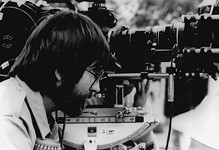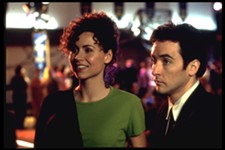Anchoress
1993, 106 min. Directed by Chris Newby. Starring Natalie Morse, Eugene Bervoets, Toyah Willcox, Christopher Eccleston, Peter Postlethwaite.
REVIEWED By Alison Macor, Fri., Sept. 23, 1994
Striking visuals and a theme that transcends its 14th-century setting mark Chris Newby's debut film Anchoress. The film's screenplay is loosely based on two letters from the late 1300s that tell the story of a young woman, Christine Carpenter (played in the film by Morse), who believed she was visited by the Virgin Mary. Christine wanted nothing more than to enclose herself in the church so that she could be nearer to “the Lady.” Anchoress (literally, walled-in recluse) depicts Christine's struggle to define her own visions and the villager's reactions to her new status as a “visionary.” Patience is required to get through the first third of the film, which is a bit obscure. However, once the conflict is established, Anchoress becomes an intriguing piece of filmmaking. Director Newby visualized the design of the film as a western, making use of the genre's spatial dynamics (open plains, isolated homesteads) to illustrate visually the struggle between Christianity and paganism. Shot in black-and-white, the film's beauty is magnificent. The lack of color conveys atmosphere much the way the blue-filtered forest scenes did in The Piano. There is a starkness to the images that is unsettling. Faces practically glow from the screen, and texture assumes a three-dimensional quality. In one scene, Christine kneels in a field to gather some wheat. A roughly woven straw hat covers her frizzed curls which lie against the nubby wool of her smock. The clarity of the black-and-white gives every shot depth and richness. While some filmmakers believe that to focus on a film's cinematography is to undercut its overall impact, this is not the case with Anchoress. The film's look is essential to the success of the story. We are able to concentrate on the plainness of Christine's cell, to feel the dirt under her fingernails as day after day passes and she waits for her next vision. Meanwhile, the Priest (Eccleston) wants to use her as his ticket up the papal ladder. The Reeve (a lesser church figure played by Eugene Bervoets) sees Christine as the perfect wife. Only Christine's mother, Pauline (Willcox), sees through the power that Christine's visions bring to her. Suspected to be a witch, Pauline represents the pagan influences in the small village. Her insights are sharp, and she acts as a buffer between church rules and the harsh realities of 14th-century life for the villagers. Because of Pauline's survivalist nature, her daughter's willingness to surrender herself to the corrupt church comes as a betrayal. However, the film shows that Christine is not as trapped by her visions as her mother fears. Graphic in its depiction of women's limited choices during the 14th century, Anchoress testifies to the power and timelessness of being able to speak in one's own voice and words.
A note to readers: Bold and uncensored, The Austin Chronicle has been Austin’s independent news source for over 40 years, expressing the community’s political and environmental concerns and supporting its active cultural scene. Now more than ever, we need your support to continue supplying Austin with independent, free press. If real news is important to you, please consider making a donation of $5, $10 or whatever you can afford, to help keep our journalism on stands.
Feb. 26, 2010
April 11, 1997
Anchoress, Chris Newby, Natalie Morse, Eugene Bervoets, Toyah Willcox, Christopher Eccleston, Peter Postlethwaite







